Si su gato dejó de comer repentinamente, definitivamente puede ser preocupante. Sin embargo, si por lo demás están actuando con normalidad, realmente puede hacer que te preguntes exactamente qué está pasando. Amamos a nuestros bebés peludos. Cuando algo no está bien, queremos llegar al fondo del problema y hacer que todo vuelva a la normalidad. Si te has estado preguntando, "¿por qué mi gato no come mucho pero actúa normal?" has venido al lugar correcto. Echemos un vistazo a las diversas razones por las que el apetito de un gato podría cambiar.
tabla de contenidos
- Cómo saber si un gato no está comiendo
- Razones por las que un gato no puede comer mientras sigue actuando normal
- Condiciones de salud que pueden afectar los hábitos alimenticios de un gato
- Problemas psicológicos o de comportamiento que pueden afectar los hábitos alimenticios de un gato
- Otras posibles razones por las que un gato puede no estar comiendo mucho
- ¿Cuánto tiempo puede estar un gato sin comer?
- Determinar la causa de la disminución del apetito de tu gato
- Cómo hacer que tu gato empiece a comer de nuevo
- Cambios en el apetito de tu gato
- preguntas frecuentes
Cómo saber si un gato no está comiendo
Si tiene más de un gato, puede ser un poco difícil determinar si uno de sus gatos ha dejado de comer. Si se pregunta si uno de sus gatos realmente come algo o lo suficiente, intente separar a sus gatos para algunas comidas y alimentarlos en diferentes habitaciones. Esto te ayudará a evaluar si uno de ellos está dejando toda su comida o si realmente se está comiendo una parte.
Incluso si su gato parece estar comiendo menos que antes, es posible que siga consumiendo suficientes calorías para mantenerse saludable. Puede ponerse en contacto con su veterinario para determinar la cantidad mínima de calorías que necesita. Luego, puede calcular cuánto obtienen en realidad en función de la cantidad de alimentos que comen. Considere pesar su plato de comida antes y después de comer para saber exactamente cuánto comió.
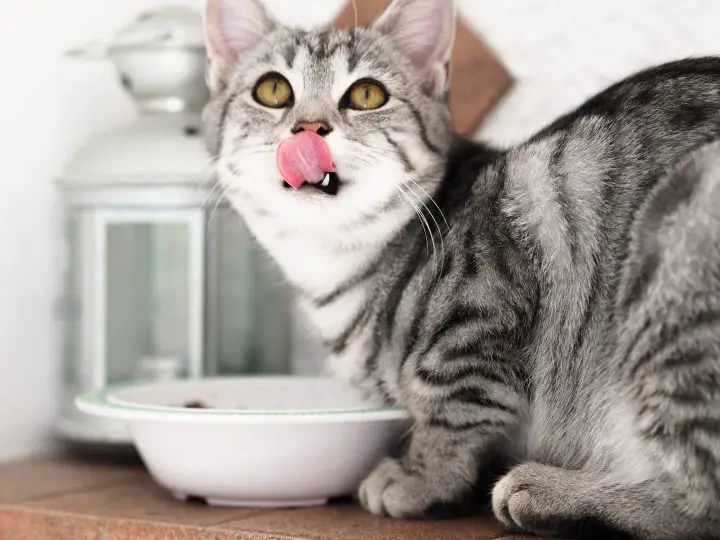
Razones por las que un gato no puede comer mientras sigue actuando normal
Desafortunadamente, identificar las razones por las que su gato no come mientras sigue actuando normalmente no es una tarea simple y directa. En realidad, hay una amplia gama de posibles razones que pueden causar este comportamiento en los gatos. En las próximas secciones, entraré en más detalles sobre cada posibilidad.
Condiciones de salud que pueden afectar los hábitos alimenticios de un gato
Si te estás preguntando, "¿por qué mi gato actúa normalmente pero no come?", la culpa podría ser una afección médica. Varias condiciones de salud pueden hacer que un gato deje de comer. Si sospecha alguna de estas condiciones de salud que se explican a continuación, debe programar un chequeo con el veterinario de su gato.
Problemas dentales
Varios problemas dentales pueden hacer que un gato deje de comer. Gingivitis Provoca inflamación en las encías, lo que puede resultar muy incómodo para un gato. Si no se trata, la gingivitis progresará a periodontitis, que puede dañar los dientes, ligamentos y tejidos del gato. La periodontitis puede ser muy dolorosa para los gatos y muchos pueden optar por no comer debido al dolor en la boca.
Si una enfermedad dental es la razón por la que su gato ha dejado de comer, algunos otros síntomas a los que debe prestar atención incluyen: babeo, dientes descoloridos, lamiendo los labiosdientes flojos o faltantes, encías hinchadas, rojas o sangrantes, o frotarse la boca con las patas.
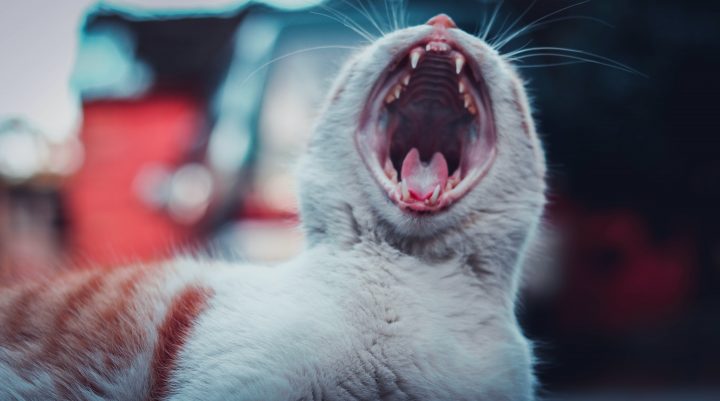
Nefropatía
No comer también puede ser un signo de nefropatía. Sin embargo, este signo a menudo se descarta ya que los gatos mayores tienen más probabilidades de desarrollar una enfermedad renal, pero también es más probable que muestren una disminución normal del apetito.
La enfermedad renal puede ser una afección muy grave. Los riñones son importantes para eliminar los desechos de nuestra sangre, mantener los niveles de electrolitos regulados y hacer posible la micción. Si sospecha que su gato tiene una enfermedad renal, programe una cita con su veterinario de inmediato. El diagnóstico temprano puede marcar la diferencia con esta enfermedad.
Problemas gastrointestinales
Los problemas gastrointestinales pueden hacer que digerir los alimentos sea muy doloroso para un gato. Si asocian este dolor con comer, el gato puede optar por dejar de comer para evitar la sensación dolorosa. Otros síntomas de problemas gastrointestinales a tener en cuenta incluyen diarrea, vómitos, pérdida de peso y letargo.
Hay una serie de diferentes problemas gastrointestinales que pueden afectar a los gatos. Algunos de estos incluyen: colitis, gastritis, cánceres del sistema digestivo, parásitos intestinales, estreñimiento, úlceras estomacales, sangrado intestinal, EII (enfermedad inflamatoria intestinal) y obstrucción gastrointestinal.
pancreatitis
Pancreatitis, que es común en los gatos., puede provocar disminución del apetito, heces blandas y vómitos. Cuando el páncreas secreta enzimas, puede provocar pancreatitis si las enzimas se filtran al tejido glandular. Esto hace que el páncreas se inflame.
Si bien puede ver algunos de los síntomas compartidos anteriormente, algunos gatos con pancreatitis no muestran ningún síntoma. Su veterinario deberá realizar análisis de sangre o una ecografía para diagnosticar la pancreatitis.
Cáncer
Lamentablemente, los gatos también pueden sufrir de cáncer, lo que puede causar pérdida de apetito. El linfoma, los tumores de mastocitos y los carcinomas son tres de los tipos de cáncer más comunes que pueden sufrir los gatos, aunque existen muchas otras formas posibles de cáncer.
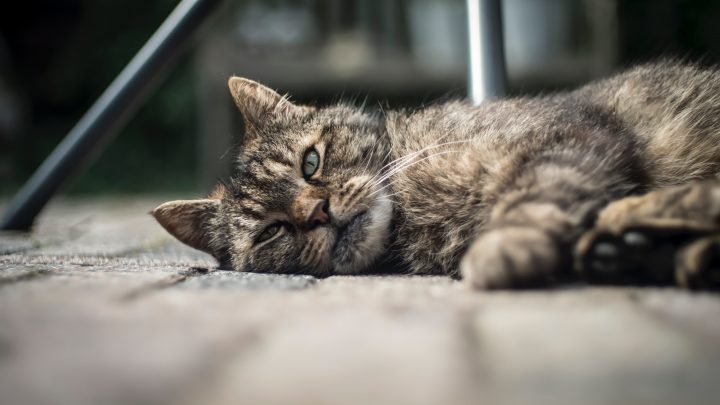
Enfermedad del higado
Otra posible causa de pérdida de apetito en los gatos es la enfermedad hepática. La enfermedad hepática, que a menudo es causada por otra enfermedad, hace que el hígado se inflame. Otros síntomas que puede ver en un gato con enfermedad hepática incluyen heces blandas, pérdida de peso, vómitos, encías, piel u ojos amarillentos y orina más oscura. Un veterinario deberá diagnosticar la enfermedad hepática realizando un análisis de sangre, tomando una biopsia o usando imágenes.
Hipertiroidismo
La glándula tiroides en gatos con hipertiroidismo Secreta más hormonas tiroideas de las necesarias. Esto puede provocar pérdida de peso, estreñimiento y una tasa metabólica más alta. Muchos gatos tendrán un mayor apetito con hipertiroidismo, pero algunos verán una disminución en su apetito. Su veterinario deberá realizar análisis de sangre para diagnosticar esta afección. Es más probable que ocurra en gatos que tienen al menos 10 años.
diabetes mellitus
¿Has notado que tu gato no come pero bebe mucha agua? Una posible explicación para este comportamiento es diabetes mellitus. Cuando un gato no tiene suficiente insulina en su cuerpo o su cuerpo ya no responde a la insulina, la glucosa de los alimentos que come no puede ingresar a sus células. Esto significa que la glucosa permanece en el torrente sanguíneo, lo que provoca un nivel alto de azúcar en la sangre.
La diabetes mellitus suele ir acompañada de un aumento del apetito. Sin embargo, también puede ocurrir pérdida de apetito, particularmente en gatos con una forma más avanzada de la enfermedad.
Enfermedad infecciosa
Varios tipos de enfermedades infecciosas también pueden hacer que un gato pierda el apetito. Las enfermedades infecciosas incluyen virus (como la leucemia felina o el herpes felino), hongos (como blastomies o criptococo), bacterias (como E. coli y estafilococo) y parásitos (como anquilostomas, lombrices intestinales y gusanos del corazón). Si alguna de estas condiciones hace que un gato se sienta lo suficientemente enfermo, puede tener un impacto negativo en su apetito.
Enfermedad ortopédica
La mayoría de las enfermedades ortopédicas, como la artritis, no provocan pérdida del apetito. Sin embargo, en algunos casos en los que la afección realmente ha progresado, el dolor que siente un gato puede ser suficiente para que deje de comer.
Además, la enfermedad ortopédica también puede dificultar que un gato llegue a su comida. El dolor de moverse puede ser demasiado para soportar, o el gato puede volverse demasiado lento para competir con otros gatitos en la casa por la comida disponible.
Lesiones y Trauma
Cuando un gato sufre una lesión grave, puede sentir mucho dolor o tener dificultad para moverse. Al igual que con las enfermedades ortopédicas, una lesión también puede hacer que un gato deje de comer si su dolor es demasiado o si tiene problemas para acceder a su comida.
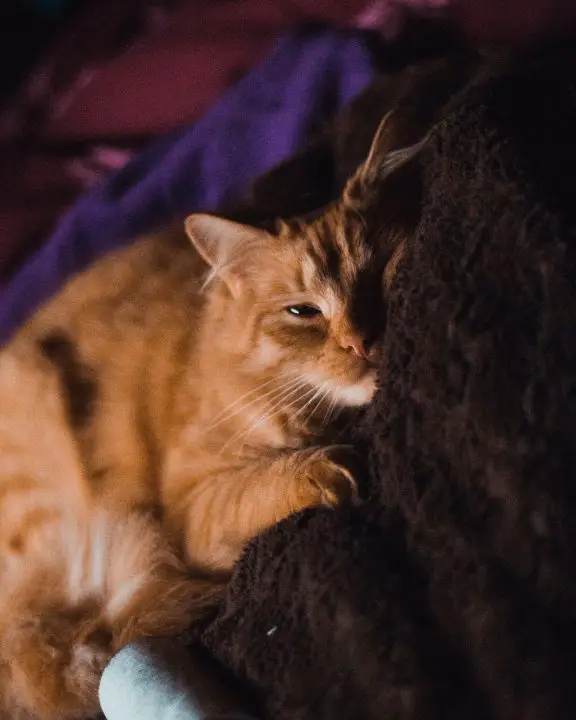
Problemas psicológicos o de comportamiento que pueden afectar los hábitos alimenticios de un gato
Además de los problemas de salud física, los problemas de salud psicológica o conductual también pueden hacer que un gato deje de comer. Su veterinario también será un buen recurso si sospecha que alguno de estos problemas está causando la disminución del apetito de su gato.
Estrés o Ansiedad
¿Mi gato no come por estrés? Sí, el estrés y la ansiedad son dos de las posibles razones por las que los gatos pueden dejar de comer. Cuando un gato se siente estresado o ansioso, su cuerpo puede verse afectado de múltiples formas. Estos incluyen sentirse más cansado de lo habitual, desaprender a usar la caja de arena y, por supuesto, una disminución del apetito.
Si recientemente trajo a casa un nuevo gatito, es posible que se pregunte por qué el nuevo gato no come mucho pero actúa normal. Una posible explicación para esto es el estrés también. Cuando se lleva a los gatos a un nuevo entorno, puede causarles mucho estrés hasta que comienzan a sentirse más cómodos y aclimatados.
Depresión
La depresión es otro estado psicológico que puede afectar el apetito de un gato. Cuando los gatos se sienten deprimidos, pueden perder interés en la comida. Otros signos de depresión a tener en cuenta incluyen dormir más de lo normal, acicalarse más de lo habitual, actuar de manera más pegajosa con su dueño, orinar fuera de la caja de arena y rascarse en exceso u otras acciones destructivas.
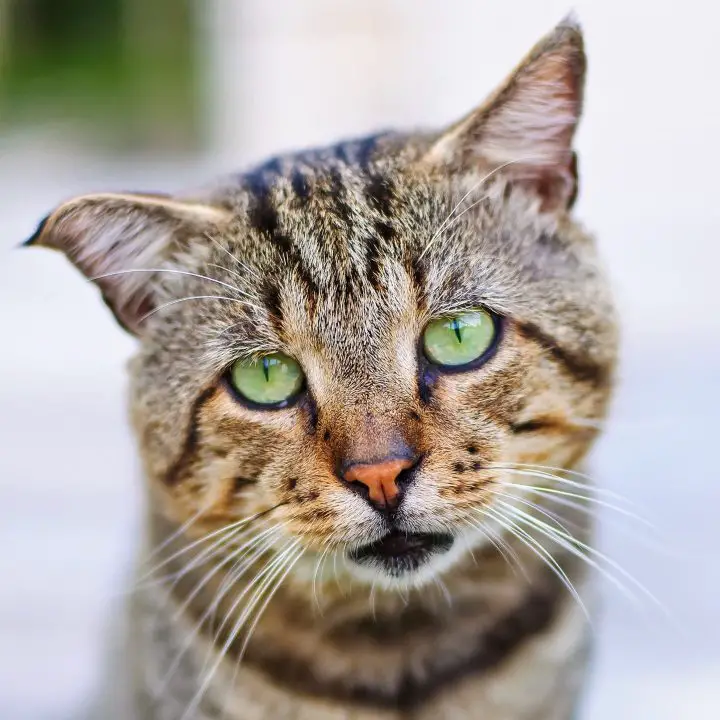
Otras posibles razones por las que un gato puede no estar comiendo mucho
Hay algunas otras posibles razones a tener en cuenta cuando intenta averiguar qué ha causado la pérdida de apetito de su gato. Algunos de estos pueden requerir una visita al veterinario, mientras que otros pueden ser más fáciles de abordar cambiando algunas cosas en casa.
Ser quisquilloso con la comida o estar aburrido de la comida actual
Si nota que su gato pide comida pero no come, es posible que no esté contento con su comida actual. Los gatos pueden ser quisquillosos con la comida y es posible que no disfruten la comida que les estás sirviendo. Si recientemente cambió a una nueva marca o nuevo sabor, es posible que no estén contentos con el cambio.
Incluso si no has cambiado de comida recientemente, también es posible que tu gato se esté aburriendo de su comida actual. Si notas que todavía están interesados en golosinas u otros tipos de comida, el culpable podría ser el aburrimiento.
Edad
Si incluso se ha preguntado, "¿los gatos comen menos a medida que envejecen?", la respuesta suele ser sí. El sentido del gusto y el olfato de un gato (junto con sus otros sentidos) puede debilitarse con la edad. Con un sentido del gusto y del olfato debilitado, su gato no disfrutará comiendo su comida tanto como antes, por lo que puede dejar de comer o empezar a comer mucho menos.
¿Cuándo empiezan a comer menos los gatos? Esto puede variar para cada gato. Sin embargo, cuando los gatos cumplen siete años, se les considera personas mayores debido a los diversos cambios físicos que experimentan sus cuerpos, que a menudo pueden incluir un cambio en sus sentidos.
Es importante tener en cuenta que es más probable que una condición médica sea la razón por la que su gato dejó de comer, en lugar de simplemente envejecer. Incluso si su gato es mayor, es posible que desee llevarlo a un chequeo con su veterinario.
Vacunación reciente
Algunas vacunas pueden causar una disminución o pérdida temporal del apetito en los gatos. Si tu gato recibió una vacuna recientemente, esta puede ser la razón por la que ha dejado de comer. En la mayoría de los casos, los efectos secundarios de la vacuna solo deberían durar unos pocos días. Si tu gato aún no ha recuperado el apetito después de este tiempo, ponte en contacto con el veterinario.
Efectos secundarios de los medicamentos
Al igual que las vacunas, los efectos secundarios de algunos medicamentos también pueden provocar una disminución del apetito. Si notó el cambio en el apetito después de comenzar un nuevo medicamento, comuníquese con el veterinario para analizar sus opciones. Sin embargo, no debe simplemente suspender el uso del medicamento sin hablar con el veterinario, ya que podría ser perjudicial para la ayuda de su gato.
Encontrar otras fuentes de alimentos
Si tienes un gato al aire libre, es posible que esté buscando comida para comer afuera. Cuando les ofreces sus comidas diarias en el interior, podrían estar llenos de lo que ya comieron.
bolas de pelo
En algunos casos, las bolas de pelo también pueden provocar que el gato deje de comer. Cuando el pelo se acumula en el estómago, el gato puede sentirse lleno. Si su gato se siente lleno, tiene sentido que no quiera comer sus comidas habituales.
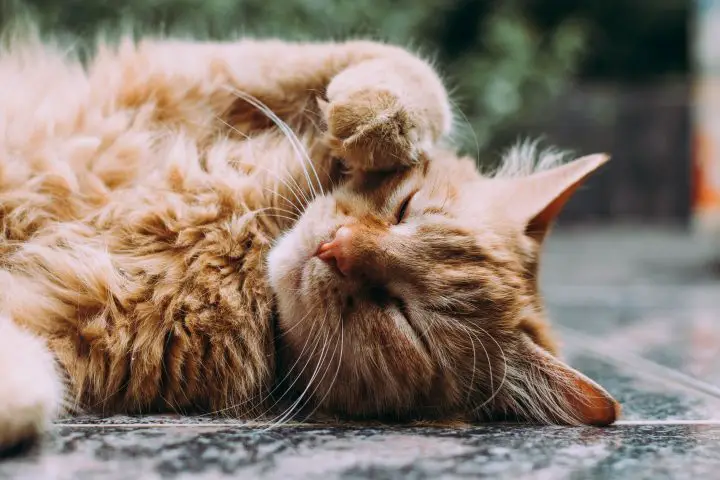
¿Cuánto tiempo puede estar un gato sin comer?
¿Puede un gato pasar 48 horas sin comer? ¿Qué pasa con períodos de tiempo incluso más largos que eso? En algunos casos, los gatos pueden sobrevivir hasta dos semanas sin comida. Sin embargo, pasar tanto tiempo sin comer tendrá consecuencias muy negativas para la salud.
La mayoría de los gatos deberían poder pasar dos o tres días sin comer antes de que su cuerpo comience a acceder a sus reservas de grasa.
También es importante asegurarse de que un gato beba suficiente agua. Tras unos días sin agua, el gato corre grave peligro de consecuencias muy negativas para su salud.
Determinar la causa de la disminución del apetito de tu gato
¿El apetito de los gatos disminuye con la edad? ¿Mi gato no come porque está enfermo, estresado o ansioso? Ahora que has aprendido algunas de las razones por las que un gato puede dejar de comer, probablemente estés ansioso por determinar cuál es la razón detrás de la pérdida de apetito de tu gatito. Si bien algunas de las razones anteriores pueden ser más fáciles de identificar, como aburrirse con su comida, otras requerirán un examen y diagnóstico veterinario.
En las próximas secciones, compartiré algunas cosas que puede intentar para que su gato comience a comer más. Sin embargo, si la razón por la que no comen se debe a una condición de salud, es probable que estas sugerencias no hagan mucha diferencia. Deberá llevar a su gato al veterinario lo antes posible para un chequeo.
Cómo hacer que tu gato empiece a comer de nuevo
La mejor manera de hacer que su gato comience a comer de nuevo variará según la razón específica por la que su gato no está comiendo. Si no está seguro de por qué su gato ha dejado de comer, debe trabajar con su veterinario para determinar la razón subyacente. El tratamiento de la causa puede ayudarlos a recuperar el apetito.
A continuación se presentan algunas sugerencias que pueden resultar útiles para algunos gatos que parecen ser quisquillosos, aburridos con su comida actual, o posiblemente incluso para aquellos que lidian con algo de estrés y ansiedad. Una vez más, la mayoría de estas sugerencias pueden no ser efectivas para los gatos con condiciones médicas, ya que será necesario abordar su condición médica para ayudarlos a recuperar el apetito.
Prueba una comida nueva
Si crees que a tu gato no le gusta la comida que le estás dando o que se aburrió de su comida, cambiar a otra cosa puede ayudarlo a comenzar a comer de nuevo.
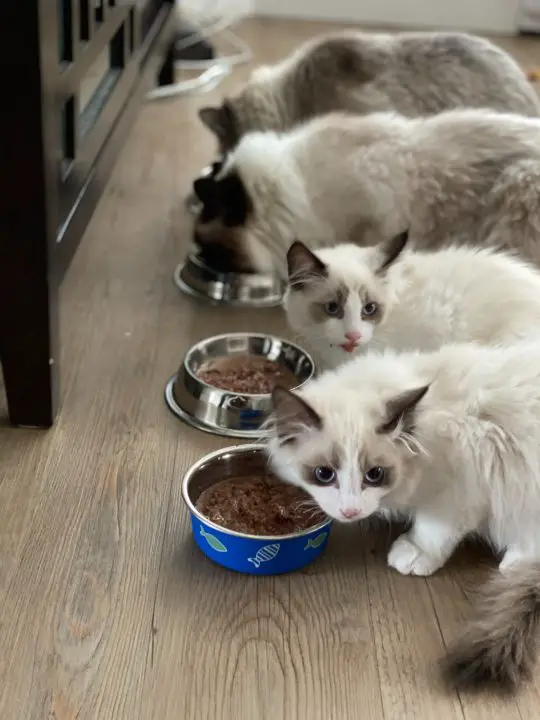
Cambiar a comida húmeda
¿Qué le das de comer a un gato que se niega a comer? Muchos propietarios han tenido éxito cambiando a alimentos húmedos. Muchos gatos prefieren el sabor más sabroso y el aroma aromático de la comida húmeda a las croquetas secas. Si este es el caso de tu gatito, ofrecerle comida húmeda puede ayudarlo a comenzar a comer nuevamente.
Además, la comida húmeda también puede ser una buena opción para gatos con problemas dentales. Es más fácil de masticar que las croquetas secas. Sin embargo, tenga en cuenta que la comida húmeda puede causar más problemas dentales porque no ayuda a mantener los dientes de un gato limpios de la misma manera que lo hacen las croquetas secas. Trate de cepillar los dientes de su gato varias veces a la semana si cambia a comida húmeda.
Trate de ofrecer comida en diferentes momentos
Si solo le ofrece comida a la misma hora todos los días, es posible que simplemente atrape a su gato durante la siesta o cuando no tiene hambre. Intente ofrecerle comidas en otros momentos del día para ver si su gato está un poco más interesado.
Ayuda a tu gato a sentirse menos estresado y ansioso
Si su gato no come debido al estrés o la ansiedad, tome medidas para ayudarlo a sentirse mejor. Algunos consejos para ayudar a disminuir el estrés de su gato incluyen:
- Establecer algunas perchas o árboles para gatos alrededor de la casa
- Asegurarse de que haya algunos escondites seguros disponibles
- Dale a tu gato mucho amor y atención.
- Trabajando en tiempo extra para jugar con tu gato
- Mantener la caja de arena limpia y colocar algunas cajas de arena adicionales
Pruebe un estimulante del apetito
¿Un gato se morirá de hambre? En algunos casos, es posible que lo hagan. Si realmente le preocupa que su gato muera de hambre, busque ayuda inmediata de su veterinario. Es posible que le recomienden un estimulante del apetito.
primeros de comida
Cuando un gato no come comida pero come golosinas, puede disfrutar que le agreguen un adorno de comida a su comida. Las golosinas son más sabrosas que la comida estándar para gatos y es posible que a tu gato no le guste el sabor de su comida. Agregar un adorno puede ayudar a que sus comidas sean más sabrosas y agradables.
Alimentación con cuchara
Algunos gatos que no comen de sus tazones pueden ser más receptivos a ser alimentados con cuchara. Caliente un poco de comida enlatada para gatos o incluso comida de pollo para bebés. Luego, ofrécelo a tu gato en la cuchara. Solo tenga en cuenta que esto no pretende ser una solución a largo plazo, pero puede ser su única opción si su gato realmente no se siente bien.
Comidas hechas en casa
Si su gato no parece interesado en croquetas secas o comida húmeda, considere prepararle algunas comidas usted mismo. Elija ingredientes simples y seguros para gatos y no agregue condimentos ni especias. Muchas especias que usamos a menudo, como el ajo y la cebolla, no son seguras para los gatos.
Este video te ayudará a ver lo que necesitarás para preparar una comida casera para tu gatito.
Cambios en el apetito de tu gato
Hay muchas explicaciones posibles de por qué un gato ha dejado de comer pero, por lo demás, parece estar actuando normalmente. Con suerte, leer la información que he compartido te ha ayudado a obtener una idea de lo que está sucediendo con tu gatito. Si le preocupa cualquier problema de salud, debe programar una cita con el veterinario de su gato para que lo revise. Su veterinario también puede ofrecerle consejos adicionales para ayudar a que su gato comience a comer nuevamente.
preguntas frecuentes
Algunos estimulantes naturales del apetito que puedes probar incluyen hierba gatera, comida para gatos enlatada y/o aderezos para comida, y aumentar la cantidad de tiempo de juego que tiene tu gatito. Su veterinario también puede proporcionarle una receta para un estimulante del apetito si lo considera necesario.
Si su gato no come, su primer paso debe ser determinar por qué no come. Programe un chequeo con el veterinario para ver si hay una condición médica subyacente que suprime su apetito. Una vez que haya diagnosticado la condición subyacente, algunas cosas que puede intentar para ayudar a su gato a comenzar a comer más incluyen cambiar a un alimento nuevo o enlatado, calentar su comida, preparar comidas caseras, ofrecer comidas en diferentes momentos durante el día y prestarle más atención a su gato para ayudarlo a sentirse menos estresado o ansioso.





